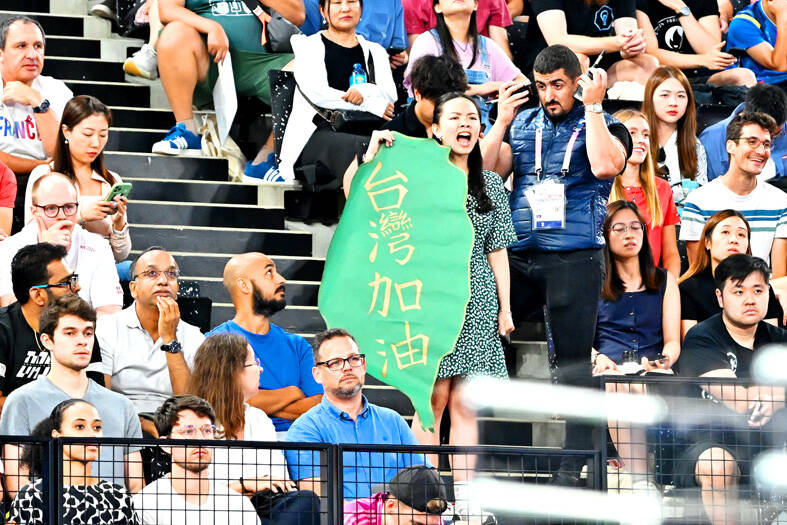The Ministry of Foreign Affairs yesterday condemned incidents in which signage supporting Taiwan was snatched from spectators watching badminton at the Paris Olympics, saying it contravened the spirit of the Games and freedom of speech.
The incident took place during the men’s doubles match on Friday, when Taiwan’s Lee Yang (李洋) and Wang Chi-lin (王齊麟) advanced to the final after beating Denmark’s Kim Astrup and Anders Skaarup Rasmussen.
A unidentified man in a pink shirt was seen seizing the sign from a female spectator — later identified as Yang Chih-yun (楊芷芸), a Taiwanese studying in France — before being removed from the stands by security. The sign was cut out in the shape of Taiwan proper and said: “Go Taiwan” in Mandarin.

Photo: Chen Chih-chu, Taipei Times
The “malicious individual” who forcibly took the sign has “seriously violated the cultural spirit of the Olympic Games, showed contempt for the rules and harmed freedom of speech,” the ministry said.
Representative to France Francois Wu (吳志中) has met with Yang and his office would provide legal assistance if she wants to press charges, the ministry said.
The International Olympic Committee’s Web site says regulations stipulate that spectators are forbidden from carrying flags that do not legally represent any participating country, nor can they carry a flag or banner that is more than 2m by 1m.

Photo: Chen Chih-chu, Taipei Times
Although the Republic of China (ROC) flag is prohibited, there is no explicit ban on items that have the word “Taiwan” written on them, the Taipei Representative Office in France said.
Yang said her sign was in line with Olympic rules.
“Taiwan will not be defeated by political ... pressure,” she said.
Wu had given her Formosan blue magpie-themed memorabilia and a pin bearing a bubble tea design during their meeting earlier that day, she added.
Yang said she was reminded by security staff at the entrance that posters or banners with certain slogans are prohibited from being carried in, but still let her through because hers did not have the ROC flag on them.
Taiwanese athletes compete in the Olympics under the name “Chinese Taipei.”
Yang said whenever she cheered “Taiwan go” during the match, the man in the pink shirt shouted “Chinese Taipei” or “Taipei team.”
In a separate incident during the same game, an Olympics staff member was “overzealous” in removing a green towel that read “Taiwan In,” the ministry said adding that it has instructed officials to issue a complaint to the Paris Games’ organizing committee.
The towel was a celebratory souvenir sold after Lee and Wang won gold in the men’s doubles at the Tokyo Olympics in 2021.
“All parties are urged to abide by the Olympics’ spirit of excellence, friendship and respect, the International Olympics Committee’s regulations, and the host nation’s laws,” the ministry said. “Spectators should remain peaceful, reasonable and respectful to others.”
In yet another incident on Friday, two Reuters journalists saw a spectator with a green banner reading “Taiwan go for it” being bodily removed up a staircase, shouting, while Taiwanese shuttler Chou Tien-chen (周天成) was playing.
The ministry also condemned their removal.
Badminton is a hugely popular sport in Taiwan and China, and both sets of supporters have been out in full force at the Paris Olympics.
While some Taiwanese have stuck to holding up the nation’s official Olympic flag, many in the crowd have roared “Taiwan” when players such as former world No. 1 Tai Tzu-ying (戴資穎) have taken to the court.
Additional reporting by Reuters

MAKING WAVES: China’s maritime militia could become a nontraditional threat in war, clogging up shipping lanes to prevent US or Japanese intervention, a report said About 1,900 Chinese ships flying flags of convenience and fishing vessels that participated in China’s military exercises around Taiwan last month and in January last year have been listed for monitoring, Coast Guard Administration (CGA) Deputy Director-General Hsieh Ching-chin (謝慶欽) said yesterday. Following amendments to the Commercial Port Act (商港法) and the Law of Ships (船舶法) last month, the CGA can designate possible berthing areas or deny ports of call for vessels suspected of loitering around areas where undersea cables can be accessed, Oceans Affairs Council Minister Kuan Bi-ling (管碧玲) said. The list of suspected ships, originally 300, had risen to about

DAREDEVIL: Honnold said it had always been a dream of his to climb Taipei 101, while a Netflix producer said the skyscraper was ‘a real icon of this country’ US climber Alex Honnold yesterday took on Taiwan’s tallest building, becoming the first person to scale Taipei 101 without a rope, harness or safety net. Hundreds of spectators gathered at the base of the 101-story skyscraper to watch Honnold, 40, embark on his daredevil feat, which was also broadcast live on Netflix. Dressed in a red T-shirt and yellow custom-made climbing shoes, Honnold swiftly moved up the southeast face of the glass and steel building. At one point, he stepped onto a platform midway up to wave down at fans and onlookers who were taking photos. People watching from inside

Japan’s strategic alliance with the US would collapse if Tokyo were to turn away from a conflict in Taiwan, Japanese Prime Minister Sanae Takaichi said yesterday, but distanced herself from previous comments that suggested a possible military response in such an event. Takaichi expressed her latest views on a nationally broadcast TV program late on Monday, where an opposition party leader criticized her for igniting tensions with China with the earlier remarks. Ties between Japan and China have sunk to the worst level in years after Takaichi said in November that a hypothetical Chinese attack on Taiwan could bring about a Japanese

The WHO ignored early COVID-19 warnings from Taiwan, US Deputy Secretary of Health and Human Services Jim O’Neill said on Friday, as part of justification for Washington withdrawing from the global health body. US Secretary of State Marco Rubio on Thursday said that the US was pulling out of the UN agency, as it failed to fulfill its responsibilities during the COVID-19 pandemic. The WHO “ignored early COVID warnings from Taiwan in 2019 by pretending Taiwan did not exist, O’Neill wrote on X on Friday, Taiwan time. “It ignored rigorous science and promoted lockdowns.” The US will “continue international coordination on infectious